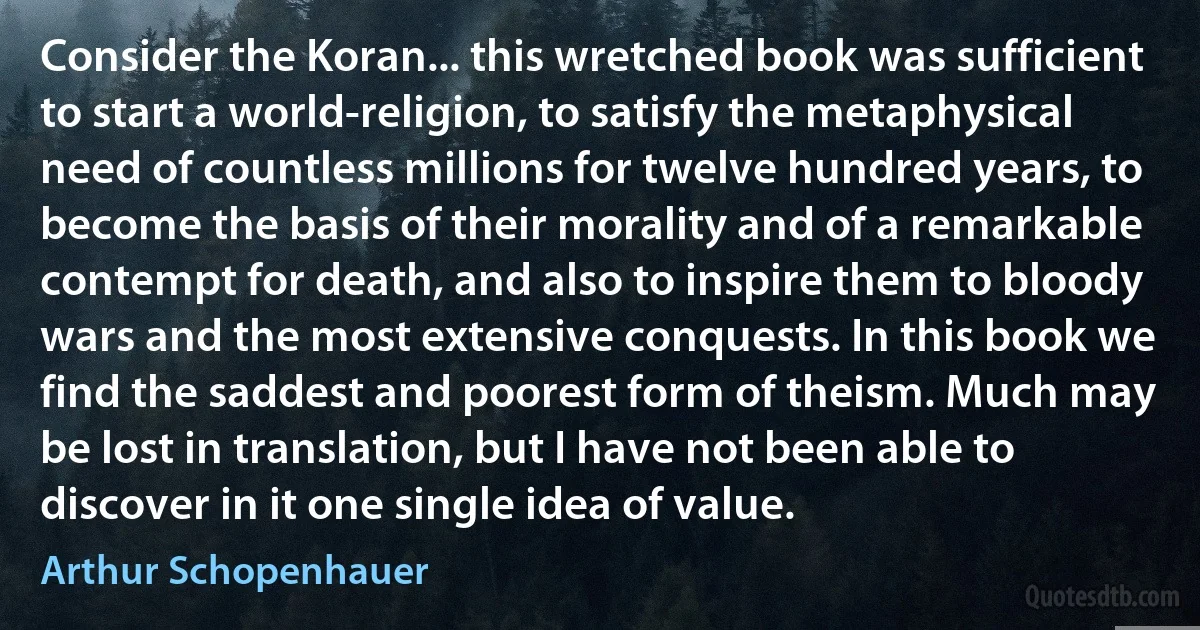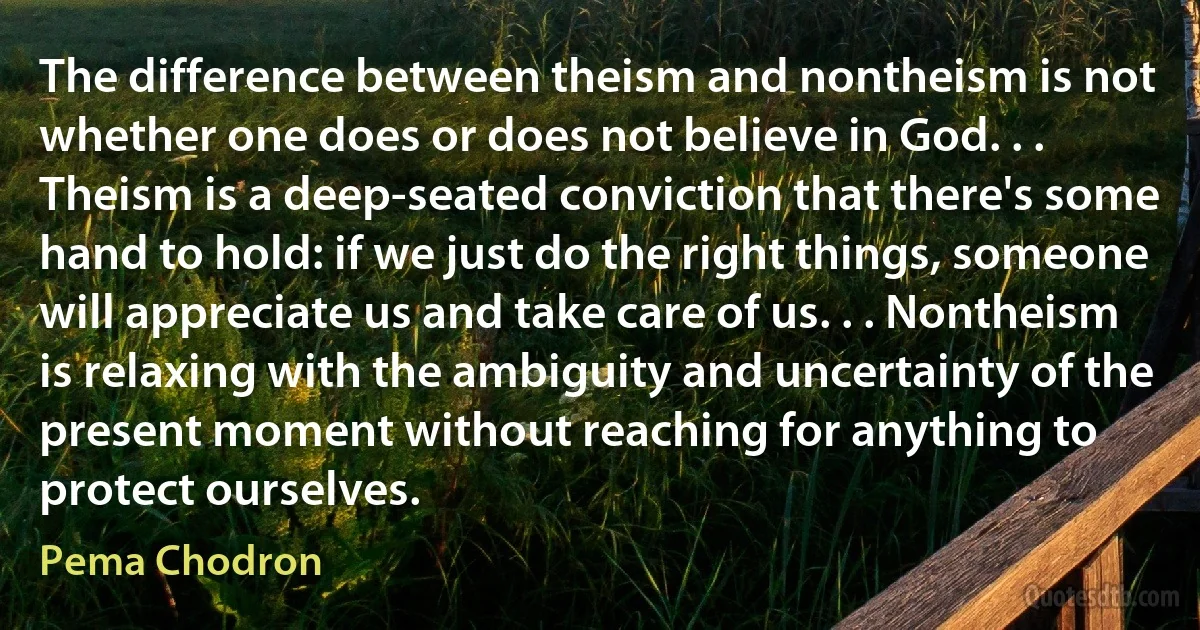Theism Quotes
Speculative philosophy as the realisation of God is the positing of God, and at the same time his cancellation or negation; theism and at the same time atheism: for God – in the sense of theology – is God only as long as he is taken to be a being distinguished from and independent of the being of man as well as of nature. The theism that as the positing of God is simultaneously his negation or, conversely, as the negation of God equally his affirmation, is pantheism. Theological theism – that is, theism properly speaking – is nothing other than imaginary pantheism which itself is nothing other than real and true theism.

Ludwig Andreas Feuerbach
Atheism ... in its philosophic aspect refuses allegiance not merely to a definite concept of God, but it refuses all servitude to the God idea, and opposes the theistic principle as such. Gods in their individual function are not half as pernicious as the principle of theism which represents the belief in a supernatural, or even omnipotent, power to rule the earth and man upon it. It is the absolutism of theism, its pernicious influence upon humanity, its paralyzing effect upon thought and action, which Atheism is fighting with all its power.

Emma Goldman
The real reason Charles Darwin distresses people, I would argue, is not that he stumbled on an argument against theism. No, the problem was that he replaced theism-replaced it with a construct more beautiful and majestic than any account of the Supreme Being outside the Book of Job, a construct that invites us to see every variety of life, from aphids to archbishops, zygotes to zoologists, as vibrant threads in an epic tapestry, its warp and woof stretching across the eons and back to the Precambrian ooze, the seminal sea-vents, the primordial clay-pits, or wherever it all began. An astonishing construct, a mind-boggling construct, a construct of which Jehovah is understandably and insanely jealous.

James K. Morrow
The issue of theism vis-à-vis atheism, in the ordinary senses of the English words, played an important role in Indian thought. The ancient Indian tradition, however, classified the classical systems (darshanas) into orthodox (astika) and unorthodox (nastika). Astika does not mean "theistic,” nor does nastika mean "atheistic.” Panini, a 5th-century-BCE grammarian, stated that the former is one who believes in a transcendent world (asti paralokah) and the latter is one who does not believe in it.

Pāṇini
Sri Aurobindo, for one, insisted on the radically different spirit in Sikhism as compared with Islam: 'Those ways of Indian cult which most resemble a popular form of Theism, are still something more; for they do not exclude, but admit the many aspects of God. (...) The later religious forms which most felt the impress of the Islamic idea, like Nanak's worship of the timeless One, Akla, and the reforming creeds of today, born under the influence of the West, yet draw away from the limitations of western or Semitic monotheism. Irresistibly they turn from these infantile conceptions towards the fathomless truth of Vedanta.

Koenraad Elst
What terrible questions we are learning to ask The former men believed in magic, by which temples, cities, and men were swallowed up, and all trace of them gone. We are coming on the secret of a magic which sweeps out of men's minds all vestige of theism and beliefs which they and their fathers held and were framed upon.

Ralph Waldo Emerson
Theism (whether Christian, Jewish, or Muslim) holds that God by wisdom created the world. The origin of the world and its subsequent ordering thus results from the designing activity of an intelligent agent-God. Naturalism, on the other hand, allows no place for intelligent agency except at the end of a blind, purposeless material process. Within naturalism, any intelligence is an evolved intelligence. Moreover, the evolutionary process by which any such intelligence developed is itself blind and purposeless. As a consequence, naturalism makes intelligence not a basic creative force within nature but an evolutionary byproduct. In particular, humans (the natural objects best known to exhibit intelligence) are not the crown of creation, not the carefully designed outcome of a purposeful creator, and certainly not creatures made in the image of a benevolent God. Rather, humans are an accident of natural history.

William A. Dembski
He has tried natural religion, and has found this frail bark unfit to carry humanity. Seeing it sinking under him, he has hastened to pass into another vessel; that is to say, that theism, like atheism, has disappointed him. Always despair, you say. But let us have done with this singular reproach. In fact, what is it to you whether I have begun with despair or not? Am I obliged to render you an account of the matter? I was only responsible to you, or rather to myself, to examine. Have I done so? That is the question. And to return to Pascal; has Pascal examined? Has Pascal been convinced? Has Pascal become a Christian by conviction? Or has Pascal thrown himself into the faith as into a dark abyss? Has his conversion been nought but a suicide of his reason? I appeal on this point to all who have read the Thoughts, to all who are acquainted with the life of Pascal.

Alexandre Vinet
His [Hegel's] early and decisive break with theism came in correspondence with Schelling and Hölderlin, who were reading Fichte's 1794 Wissenschaftslehre as Spinozism on a Kantian foundation. He later professes his own Spinozism in bold terms. "You are either a Spinozist or not a philosopher at all” and "It is therefore worthy of note that thought must begin by placing itself at the standpoint of Spinozism; to be a follower of Spinoza is the essential commencement of all Philosophy. For as we saw above, when man begins to philosophize, the soul must commence by bathing in this ether of the One Substance in which all that man has held as true has disappeared”.

Baruch Spinoza
...But no matter how enamoured one may be with Postmodernist instability of meanings and signification slippage, absolutely nothing can make spinozisme as employed in Diderot's Promenade and the Encyclopédie, or in High Enlightenment literature, compatible with Revelation, divine providence, religious authority, theism, mysticism, fideism, eclecticism, moral relativism, Aristotelian substances, Platonic ideals, Prisca theologia (natural religion), Cartesian dualism, Lockean dualism based on supra rationem, double truth, fixity of species, Epicurean swerves, La Mettrie's materialism, or skepticism. ‘Spinozists' a term already in very wide use, in Britain, Germany, France, and Italy, as well as Holland well before 1700, and ‘spinozisme' as used in eighteenth-century France, can never mean, or ever be blended with, any of these trends. It may not always be a rigorous philosophical-theological category.

Baruch Spinoza
The philosopher John Toland, in the early 18th century, insisted that the terms 'Spinozism' and 'pantheism' are synonymous. Toland says that "Moses was, to be sure, a Pantheist, or, if you please, in more current terms, a Spinosist", while Spinoza's pantheism was taken for granted by Moses Mendelssohn, Gotthold Lessing and Friedrich Jacobi, in their famous Pantheismusstreit of 1785. More recently, this interpretation also appears in both the scholarly literature and popular representations of Spinoza's thought. In the recently published Cambridge Dictionary of Philosophy we read that "Spinoza is the most distinguished pantheist in Western philosophy". But the problem with calling Spinoza a 'pantheist' is that pantheism is still a kind of theism.

Baruch Spinoza



